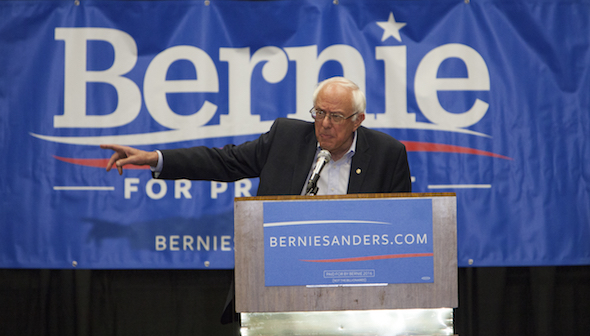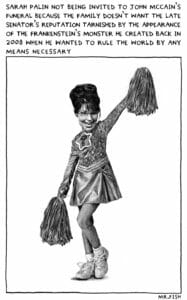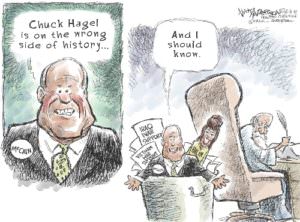The Endgame of 2016’s Anti-establishment Politics
Will Bernie Sanders’ supporters rally behind Hillary Clinton if she gets the nomination? Likewise, if Donald Trump is denied the Republican nomination, will his supporters back whoever gets the Republican nod? Juli Hansen / Shutterstock
Juli Hansen / Shutterstock
This post originally ran on Robert Reich’s website.
Will Bernie Sanders’s supporters rally behind Hillary Clinton if she gets the nomination? Likewise, if Donald Trump is denied the Republican nomination, will his supporters back whoever gets the Republican nod?
If 2008 is any guide, the answer is unambiguously yes to both. About 90 percent of people who backed Hillary Clinton in the Democratic primaries that year ended up supporting Barack Obama in the general election. About the same percent of Mike Huckabee and Mitt Romney backers came around to supporting John McCain.
But 2008 may not be a good guide to the 2016 election, whose most conspicuous feature is furious antipathy to the political establishment.
Outsiders and mavericks are often attractive to an American electorate chronically suspicious of political insiders, but the anti-establishment sentiments unleashed this election year of a different magnitude. The Trump and Sanders candidacies are both dramatic repudiations of politics as usual.
If Hillary Clinton is perceived to have won the Democratic primary because of insider “superdelegates” and contests closed to independents, it may confirm for hardcore Bernie supporters the systemic political corruption Sanders has been railing against.
Similarly, if the Republican Party ends up nominating someone other than Trump who hasn’t attracted nearly the votes than he has, it may be viewed as proof of Trump’s argument that the Republican Party is corrupt.
Many Sanders supporters will gravitate to Hillary Clinton nonetheless out of repulsion toward the Republican candidate, especially if it’s Donald Trump. Likewise, if Trump loses his bid for the nomination, many of his supporters will vote Republican in any event, particularly if the Democratic nominee is Hillary Clinton.
But, unlike previous elections, a good number may simply decide to sit out the election because of their even greater repulsion toward politics as usual – and the conviction it’s rigged by the establishment for its own benefit.
That conviction wasn’t present in the 2008 election. It emerged later, starting in the 2008 financial crisis, when the government bailed out the biggest Wall Street banks while letting underwater homeowners drown.
Both the Tea Party movement and Occupy were angry responses – Tea Partiers apoplectic about government’s role, Occupiers furious with Wall Street – two sides of the same coin.
Then came the Supreme Court’s 2010 decision in “Citizens United vs. the Federal Election Commission,” releasing a torrent of big money into American politics. By the 2012 election cycle, forty percent of all campaign contributions came from the richest 0.01 percent of American households.
That was followed by a lopsided economic recovery, most of whose gains have gone to the top. Median family income is still below 2008, adjusted for inflation. And although the official rate of unemployment has fallen dramatically, a smaller percentage of working-age people now have jobs than before the recession.
As a result of all this, many Americans have connected the dots in ways they didn’t in 2008.
They see “crony capitalism” (now a term of opprobrium on both left and the right) in special tax loopholes for the rich, government subsidies and loan guarantees for favored corporations, bankruptcy relief for the wealthy but not for distressed homeowners or student debtors, leniency toward corporations amassing market power but not for workers seeking to increase their bargaining power through unions, and trade deals protecting the intellectual property and assets of American corporations abroad but not the jobs or incomes of American workers.
Last fall, when on book tour in the nation’s heartland, I kept finding people trying to make up their minds in the upcoming election between Sanders and Trump.
They saw one or the other as their champion: Sanders the “political revolutionary” who’d reclaim power from the privileged few; Trump, the authoritarian strongman who’d wrest power back from an establishment that’s usurped it.
The people I encountered told me the moneyed interests couldn’t buy off Sanders because he wouldn’t take their money, and they couldn’t buy off Trump because he didn’t need their money.
Now, six months later, the political establishment has fought back, and Sanders’s prospects for taking the Democratic nomination are dimming. Trump may well win the Republican mantle but not without a brawl.
As I said, I expect most Sanders backers will still support Hillary Clinton if she’s the nominee. And even if Trump doesn’t get the Republican nod, most of his backers will go with whoever the Republican candidate turns out to be.
But anyone who assumes a wholesale transfer of loyalty from Sanders’s supporters to Clinton, or from Trump’s to another Republican standard-bearer, may be in for a surprise.
The anti-establishment fury in the election of 2016 may prove greater than supposed.
Your support is crucial…With an uncertain future and a new administration casting doubt on press freedoms, the danger is clear: The truth is at risk.
Now is the time to give. Your tax-deductible support allows us to dig deeper, delivering fearless investigative reporting and analysis that exposes what’s really happening — without compromise.
Stand with our courageous journalists. Donate today to protect a free press, uphold democracy and unearth untold stories.





You need to be a supporter to comment.
There are currently no responses to this article.
Be the first to respond.